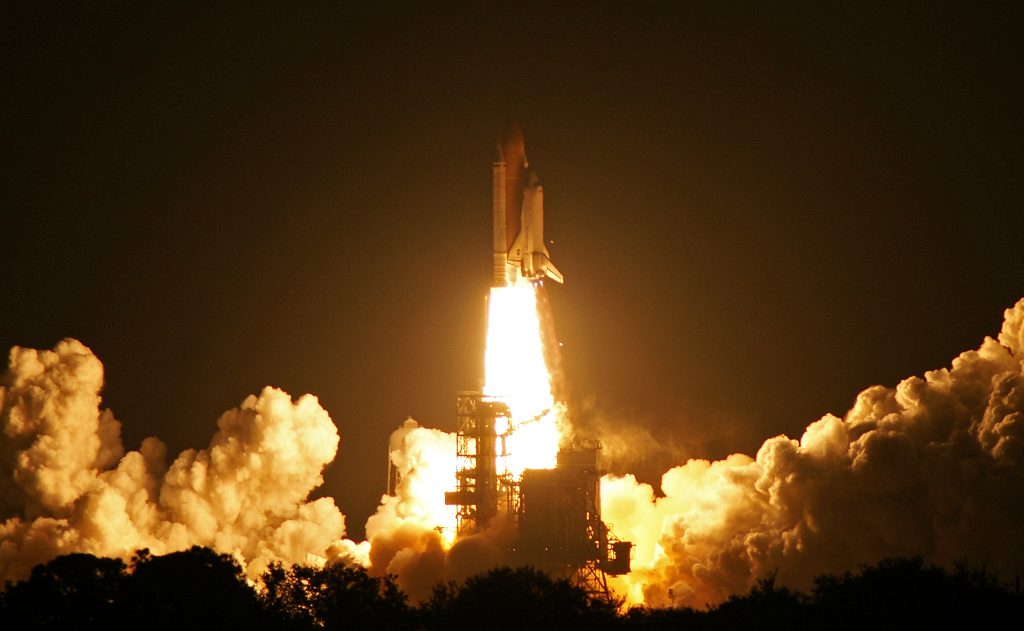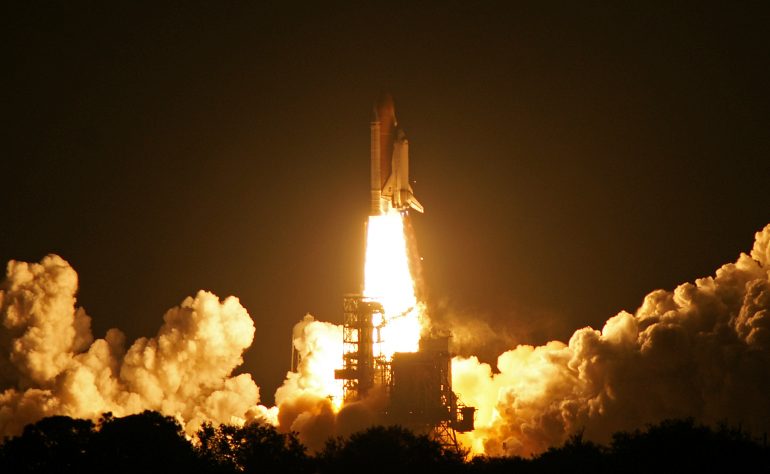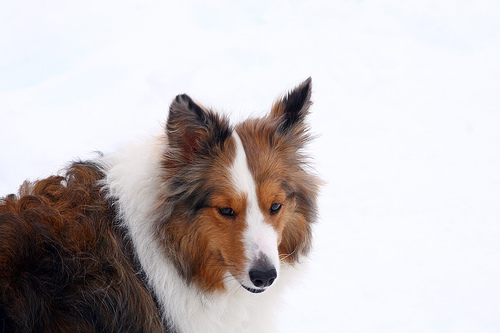Ashley Strosnider

for Guy Bluford, first African American in space
August 30, 1983.
Those who watched it were quiet, though they wouldn’t have needed to be, especially up close. The sound didn’t carry out to Titusville on Highway 1, to the banks of the Indian River, where some of the watchers waited. To the Bennett Causeway, the Beach Line Expressway. Up and down A-one-A south in Cocoa Beach. Jetty Park in the Cape, or the Air Force Station. Folding chairs had been claiming their space for hours. A little bit of booze in coolers dotted the grass, Thermoses full of coffee gone cold, even in that heat, to keep the eyes pried open, lids up late, then later as they waited, kept waiting. The storm rumbled across the coast, peppering the sky with bright flashes that made everyone suddenly wary of their umbrellas, tiny handheld lightning rods. But weren’t they grounded, feet in the dirt turning sludgy in puddles, rubber soles on pavement? A great cosmic joke, someone suggested. Zeus throwing down rods of fire at these five smug little Icaruses. They felt small beneath thunderheads, cloud cover pressing close. Still, there was hope in the magnitude of the happening. The mythology of profound achievement was still enough to buoy them, to suggest there was a way out of this whole cold world, after all.
Twelve million pounds locked and waiting just two stories up. From out there, it might have been a toy. Television screens miniaturized it too: the enormity, pixelated, didn’t quite translate. It took some small measure of spiritual mysticism to believe it could even be real. But they had done it before. They would do it again, and again, on into the future of the universe, and the watchers who were still left would eventually forget to keep watching.
The watchers couldn’t see a thing out there, and midnight slid past like so much wet velvet, like a seal slipping back into the sea. Two more hours passed, the scheduled time looming then delayed. It was a dilemma: how long to stay? But the longer they waited, the surer they were. Hold on, the watchers told each other. We’ve waited this long. See it through. Another jagged bolt tore the sky. Soon, the radio promised. The captain had called it. The men were boarding the craft. The men were sweating, joking, checking, double-checking, triple-checking, silently speaking the rosary into the sky. Then another seventeen-minute delay.
This was not the sixties. This was not the fresh blaze of a new frontier, the desperate proof of political viability on the world stage. This was just another government operation, like so many others before it. Just a little bit flashier. Like the people who’d gathered in the desert to watch bombs drop, to watch the mushroom clouds billow up from craters and marvel at the power of an atom, to suck in deep breaths of ooh and ahh and radiation that would silently eat at them for years from the inside out. People still watched because it couldn’t not be a spectacle: with all the lights out, it would burn brighter than ever. And so what if some of the new had worn off and the watchers were no longer a perfect cross-section of America. So what if they were nerds, people who watched sci-fi movies because someone had made the mistake of giving them microscopes when they were kids. Or if they were speed junkies, the same people who showed up for Daytona races, just for the roar of it. Or if they were only bored locals who marked the passage of time with the breaking of the sound barrier somewhere above their heads. One small step for man. One more way to feel miniscule.
The world did not stop turning just because a handful of men might leave its orbit. It spun on its axis, it whispered and grumbled and made its sounds. Roadside, palm fronds shushed each other as a breeze stole through. In the parks, frogs sang, exuberant in the warm summer rain. Trucks barreled down the highways on deadlines that did not pause for stargazing—especially when the rain guaranteed there were no stars to see anyway. A train whistled, its low-slung song a near anachronism there in the face of the future, as if to say: you’ve known the roar of speed and burn for a century, and you’ll tire of this, too, soon enough. Horses stomped. Cows chewed. Dogs curled up in kennels. Cats crept toward mice and pounced. Suburban kitchens winked dark, perfumed in Pine-Sol. Kids dreamed. Someone slipped out of bed and ate the leftover macaroni after his wife fell asleep. Someone slipped out of bed and into the den, left her husband snoring while she cradled a phone against her cheek, whispering to a lover as the TV flicked on, muted. In the city, the things that always roared kept roaring in accordance with their own rhythms, oblivious. Everything that always happened was always happening.
But there was a pleasure in the waiting, too, permission to do nothing at all but keep the eyelids up, or possibly to hope, or maybe, if you were feeling superstitious, to pray. It might as well have been a holiday. A holy day of obligation. Someone knocked the cap off a water bottle whose contents slugged down onto his radio just as the voice started up again. “Goddamn it to hell,” he hissed, while the broadcast voice slowed, scattered, stopped.
And then, here it was. It was happening. History was happening, and they were watching. One watcher cranked the volume on his boom box, and those in listening range gathered in, grouped together, clicked off their little handheld radios, crackling small and tinny by comparison. T-Minus one minute and counting. The watchers were ready, grinning, prepared to be fully amazed.
Ten. They rocked up on their toes and back down, bouncing.
Nine. They grasped their cameras, grown heavy on straps slung around necks, eight, pocketed lens caps, seven, wiped lenses on the hems of their T-shirts.
Six. They grasped hands with whoever stood beside them.
Five. They hugged their arms close to their tiny bodies. Four. They thought they could see something, a brightness gathering there at the base as three, they sucked in great, deep breaths and held them.
Two. They felt the capacity of their lungs, the pressure and pleasure of the exhale deferred.
One. They felt their feet heavy on the ground.
Seven million pounds of thrust and fire, lit up bright as a daylight launch. We have liftoff, the radio confirmed. And we did, didn’t we? But this was not so new: men had gone to space before, had even walked on the moon. Just months before, many of them had watched the first American woman break gravity, move into orbit. These were not the golden years anymore, those first early years of fresh impossibility, but still there were firsts to be had. The first night launch. The first African American in space. The oldest man in space. These three were the firsts they claimed that night, would hold in their memories for years—a tiny slice of a long history still expanding. It would surface when summoned, this immense burning light in the great darkness of the once unknowable sky.
Others, elsewhere, were still watching, too. A young father yelled and woke a baby whose wail joined in with the cosmic scream while her mother rolled her eyes hard. Nurses on rounds passed by the station to hear it was go, they had made it, and because there was nothing better to talk about anyway, they carried the confirmation up and down halls to patients waiting to hear some good news, eager to know man-made miracles could still happen—or ready to mutter their unbelief, call it conspiracy, call it blasphemy, call it a waste of hard-earned tax dollars. Down the streets from the hospitals—a few respectable blocks but not out of walking distance—bars full of watchers raised toasts and downed shots in good-luck cheers for the rest of the mission. A musician stopped strumming when her husband shushed her, said look. A tall kid leapt to his feet and slam-dunked a small plastic ball through the flimsy hoop hooked onto a cereal-box backboard hung over his bedroom door.
The air turned electric there in Florida, the silence broken by a boom the watchers felt from a distance too great to hear it, rumbling out across the cape like an ocean imagined inside the cup of a shell held to the ear. As the bright smoky clouds rolled out like the bottom half of a nuclear blast, the shuttle shot up, climbing high on its long tail, the watchers clapped and yelled the stale breath out of their chests. And then they were yelling, shouting, cheering, the exhale a benediction, the sweet relief of seeing that nothing had gone wrong this time. None of the watchers had wanted to witness the shuttle combusting into some manmade supernova. But they had all been sure it would be fine. They hadn’t been worried.
Yes, they yelled.
I knew it, I knew they could do it, they yelled.
Go—go on, do it, get up there, get ‘em baby, go on, go!
Other watchers were watching orange and green numbers crawl in complicated equations across massive black screens. They watched the arc and the wobble, the weather, the fuel and the fire, the velocity, the trajectory, the telemetry, the temperature, the pressure, the propulsion, the projection. Printers clicked out dots in matrix, readouts that confirmed the math, the science, the safety, the faith, the investment. They watched their calculations conjure history, promise new knowledge. The keys to the universe.
Three miles high, and 630 miles an hour. And higher, still, the shuttle climbed, a long yellow stripe across heaven. The watchers passed binoculars among themselves, ushered strangers’ kids to press sleepy eyes against telescopes balanced on tripods sinking in mud. Seven miles high, and 907 miles an hour. The trail turned black, the fire reflecting off the cloud cover, a soft orange halo surrounding the shuttle. Somewhere below them, hell burned hot. The very molten core of the earth. Thirteen miles high, 1623 miles an hour. Further down the highway, a siren screamed. A car run off the road, caught unaware, watching too closely a velocity that was not its own. A terrestrial combustion.
In daylight, the brightness of the burn was subsumed into the daylong glow of a fire always burning, that constant nuclear combustion that kept the world turning by the gravitational magnitude of its flame and force. But in darkness, what the cameras caught was all that heat, all that fire, made apparent the explosion that powered the burn, and the roar of the rocket made a sudden solemn sense. The primacy of sound both displaced and explained by what became now so obvious. Made visible, it also made clear everything the human eye could never hope to see. It had all been this big all along, and yes, we had all been exactly that small.
Higher still, and the mighty flame faded into a tiny tail burn, growing finally pinpoint little, a falling star in reverse, the impossible undoing of gravity, of the inevitable, the triumph of hope and the silence returned, a quiet like church, the rustling of sleeves, the sign of the cross. God, they said, faces upturned. Dios Mio. My God. Mother Mary. Jesus Christ. Holy… holy shit. The Almighty Fuckin’ A.
They were gone. They had done it. Disaster, inevitable as ever, had not come for them yet. And inside the shuttle, and on the recordings, a single voice laughing, laughing, all the way up.
Ashley Strosnider is a writer and editor based in Nebraska, where she recently served as managing editor of Prairie Schooner. She holds an MFA from the University of South Carolina. Her writing has appeared in Joyland, Near South, Fifth Wednesday, Smokelong Quarterly, and elsewhere. Follow her on Twitter at @bravenewlady.


